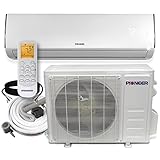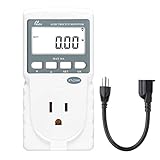Air conditioners are an essential appliance, particularly in areas with extreme temperatures. However, their high energy consumption is a cause for concern, especially for those looking to save on electricity bills or transition to independent sources of energy.
But how much electricity does an air conditioner use exactly?
Well, there are a few units of measurement that quantify each aspect of electricity, such as Amps, Volts, Watts, etc…
However, the most important aspect of electricity, and what you pay for at the end of the month, is “Electrical Energy”, which is measured in “kWh (kiloWatt-hours)”.
So, a better question to ask would be: How many kWh does an air conditioner use?
In this article, I’ll explore the Energy consumption of air conditioners, and how to measure their kWh usage, and I’ll provide estimates of the cost to run them based on their BTU ratings or tonnage.
Once we’ve established how much Electrical Energy (kWh) it takes to run your air conditioner, I’ll also discuss its Electrical Power (kW) requirements, which will be pretty informative if you’re planning on running your air conditioner on solar power, batteries, an inverter, or a generator.
Let’s dive in.
I get commissions for purchases made through links in this post.
How many kWh does an air conditioner use?
The energy consumption of an air conditioner, or the amount of kiloWatt-hours (kWh) that it uses, depends on several factors, including:
- The capacity of the air conditioner, rated in BTUs (British Thermal Units) or Tons
- The efficiency of the air conditioner
- The usage duration
- The outdoor temperature
- The quality of the insulation
While these variables make it challenging to provide an exact answer as to how much energy your air conditioner uses, to put things into perspective, the following table provides estimates of the hourly energy usage of air conditioners based on their BTU ratings:
| BTU rating | Est. Hourly Energy Consumption (kWh/hour) |
| 5000 BTU | 0.25 – 0.4 kWh/hour |
| 6000 BTU | 0.3 – 0.5 kWh/hour |
| 8000 BTU | 0.4 – 0.65 kWh/hour |
| 10000 BTU | 0.5 – 0.9 kWh/hour |
| 12000 BTU (1 ton) | 0.6 – 1 kWh/hour |
| 13500 BTU | 0.7 – 1.1 kWh/hour |
| 15000 BTU | 0.8 – 1.25 kWh/hour |
| 18000 BTU (1.5 tons) | 0.9 – 1.5 kWh/hour |
| 24000 BTU (2 tons) | 1 – 1.8 kWh/hour |
| 36000 BTU (3 tons) | 1.5 – 2.8 kWh/hour |
| 48000 BTU (4 tons) | 2 – 3.5 kWh/hour |
| 60000 BTU (5 tons) | 2.5 – 4.5 kWh/hour |
Related topics:
- How much electricity does a window air conditioner use?
- How much electricity does a mini-split air conditioner use?
- How much electricity does a portable air conditioner use?
- How much electricity does an RV air conditioner use?
- How much electricity does a heat pump use?
These estimates provide a general idea of the hourly energy consumption of air conditioners based on their capacity.
For example, a 5000 BTU (Window) air conditioner uses – on average – between 0.25 and 0.4 kWh of energy per hour of use. If a 5000 BTU air conditioner is left on for 8 hours a day, it would use between 60 and 100 kWh of energy each month.
In comparison, a 36000 BTU (3 Ton) central air conditioner uses – on average – between 1.5 and 2.8 kWh of energy per hour. If an air conditioner of this size is left on for 8 hours a day, it would use between 360 and 650 kWh of energy each month.
It is important to emphasize that these estimates are intended to provide a general perspective, and the exact energy consumption of your air conditioner will vary depending on the factors mentioned above.
However, if we eliminate some of those factors, and focus on the cooling capacity of the air conditioner (BTUs) and its rated efficiency, we could estimate the energy consumption of the AC.
More precisely, we could estimate the hourly energy consumption of the air conditioner, as in, how many kilowatt-hours (kWh) it consumes per hour of runtime.
How to estimate the kWh consumption of your air conditioner?
The BTU rating on your air conditioner denotes its cooling capacity, or in other words, it represents the amount of heat exchange that the AC can perform within an hour of operation. The greater the BTU rating of the air conditioner, the more heat exchange it can perform in an hour, and naturally, the more energy per hour (kWh/hour) the AC will consume.
However, the exact amount of energy that it will require to perform that amount of heat exchange, will depend on the Energy Efficiency of the air conditioner.
This Energy Efficiency is tested by the manufacturer and provided as an Energy Efficiency Ratio (EER), a Seasonal Energy Efficiency Ratio (SEER), or a Combined Energy Efficiency Ratio (CEER).
These energy efficiency ratios are usually specified on the EnergyGuide (yellow) label that comes with the air conditioner and can be used to estimate the hourly energy consumption of the AC as follows:
Hourly Energy Consumption (Watt-hours per hour) = BTU Rating ÷ EER, SEER, or CEER
For example, the following label is for a 10000 BTU air conditioner that has an EER of 11:

The hourly energy consumption of this air conditioner can be calculated as such:
Hourly Energy Consumption (Watt-hours per hour) = BTU Rating ÷ EER
Hourly Energy Consumption (Watt-hours per hour) = 10000 BTUs ÷ 11
Hourly Energy Consumption (Watt-hours per hour) = 909.1 Wh/hour
Now, electrical energy is more commonly measured in kilowatt-hours, or kWh for short, with 1 kWh equivalent to 1000 Wh.
To convert this energy consumption from Watt-hours to kilowatt-hours, we simply divide by 1000:
Hourly Energy Consumption (kiloWatt-hours per hour) = Hourly Energy Consumption (Watt-hours per hour) ÷ 1000
Hourly Energy Consumption (kiloWatt-hours per hour) = 909.1 Wh/hour ÷ 1000
Hourly Energy Consumption (kiloWatt-hours per hour) = 0.9 kWh/hour
It is worth noting that EER, SEER, and CEER are technically different efficiency measurements. However, for the sake of simplicity, these ratios can be used interchangeably to get some quick estimates.
However, if you want to determine the kWh usage of your AC as accurately as possible, I recommend measuring it.
How to measure the energy consumption of your air conditioner?
Measuring the energy consumption of your air conditioner is crucial to managing your electricity usage and reducing your bills. Fortunately, there are several tools available to help you measure your air conditioner’s energy consumption accurately.
One option is to use an electricity monitoring device like the Kill-A-Watt meter. This device is easy to use and connects to your air conditioner’s wall outlet or inverter.
All you’ll have to do is plug your air conditioner into the Kill-A-Watt meter, and it will measure the exact amount of energy that your air conditioner consumes over a certain period.

If, for example, you’d like to measure your air conditioner’s monthly energy consumption, you could plug your AC unit into the Kill-A-Watt meter, and check the “kWh” readings 24 hours later.
By doing this, you’d be able to measure the daily energy consumption of your air conditioner, which you can then multiply by 30 to determine its monthly energy usage.
For example, the following video shows a 5000 BTU window air conditioner that consumed 1.6 kWh of energy over 3 hours and 30 minutes.
If you have a central air conditioner that operates at 220 Volts and runs on a dedicated circuit, you can use the Emporia monitor.
This device is installed in your main electrical panel and sends real-time data to a monitoring app on your phone or tablet. However, please note that you may need to hire an electrician to set up the device for you.
In any case, the following video explains how the Emporia monitor works:
Alternatively, if you don’t want to purchase an electricity monitoring device, you can use our Appliance Energy Consumption Calculator to estimate your air conditioner’s energy usage. However, please note that the calculator will only provide estimates and might not be as accurate as using an electricity monitoring device.
Now that we’ve looked at how to measure the energy consumption of your air conditioner, or at least how to estimate it, let’s explore the costs associated with this energy consumption.
How much does it cost to run an air conditioner?
The cost to operate an air conditioner is mainly determined by three factors:
- The rate at which the air conditioner consumes energy (e.g., an energy consumption rate of 1.5 kWh per hour)
- The frequency or the duration of the usage (e.g., 8 hours per day)
- And the cost per kWh in your location (e.g., 20 cents per kWh).
To provide some perspective, the following table categorizes air conditioners by size (BTU rating or tonnage), and provides some estimates of how much it would cost to run each of them for 1 hour:
| BTU rating | Est. Hourly cost (Cents/hour) |
| 5000 BTU | 4 – 6.5 Cents/hour |
| 6000 BTU | 5 – 8 Cents/hour |
| 8000 BTU | 6.5 – 11 Cents/hour |
| 10000 BTU | 9 – 15 Cents/hour |
| 12000 BTU (1 ton) | 10 – 16 Cents/hour |
| 13500 BTU | 12 – 18 Cents/hour |
| 15000 BTU | 14 – 20 Cents/hour |
| 18000 BTU (1.5 tons) | 13 – 25 Cents/hour |
| 24000 BTU (2 tons) | 16 – 30 Cents/hour |
| 36000 BTU (3 tons) | 25 – 45 Cents/hour |
| 48000 BTU (4 tons) | 35 – 60 Cents/hour |
| 60000 BTU (5 tons) | 45 – 75 Cents/hour |
These estimates should give you a general guideline on the hourly costs of running your air conditioner.
For example, if a 24000 BTU (2 Ton) central air conditioner is left on for 8 hours a day, it would – on average – cost between $38 and $72 per month to run the air conditioner.
However, please note that the estimates provided in the table are based on the (U.S.) national average cost per kWh provided in the June 2023 data from the EIA (U.S. Energy Information Administration). The actual cost per kWh differs from state to state.
To get more accurate estimates, I recommend measuring the actual energy consumption of your air conditioner (as explained above), and factoring in the electricity costs specific to your location:
Monthly Cost To Run Your Air Conditioner (Cents) = Monthly Energy Consumption Of Your Air Conditioner (kWh) x Electricity Costs In Your Area
For example, let’s say you’d like to estimate the monthly cost to run a 12000 BTU AC. Let’s also assume the following:
- You’ve monitored the energy consumption of the air conditioner over 24 hours and determined that it uses 6.4 kWh per day:
- You live in the state of Kansas
The monthly energy consumption of the air conditioner can be calculated as such:
Monthly Energy Consumption (kWh) = Daily Energy Consumption (kWh/day) x 30 days
Monthly Energy Consumption (kWh) = 6.4 kWh/day x 30 days
Monthly Energy Consumption (kWh) = 192 kWh/month
According to the June 2023 data from the EIA (U.S. Energy Information Administration), 1 kWh of energy costs 13.5 Cents in Kansas. The monthly cost to run the air conditioner can be estimated as such:
Monthly Cost To Run Your Air Conditioner (Cents) = Monthly Energy Consumption Of Your Air Conditioner (kWh) x Electricity Costs In Your Area
Monthly Cost To Run Your Air Conditioner (Cents) = 192 kWh x 13.5 Cents/kWh
Monthly Cost To Run Your Air Conditioner (Cents) = 2592 Cents
Monthly Cost To Run Your Air Conditioner ($) = 25.92 $/month
If you don’t have an electricity monitoring device and are not planning on using one anytime soon, you can use the following calculator which will estimate the cost of running your air conditioner based on its type, size, and the area that you live in:
Now that we’ve covered the energy consumption (kWh) of your air conditioner, and how much it costs to run it, let’s discuss other electrical specifications that may be relevant if you’re looking to power your AC with alternative energy sources.
How much power, or how many watts, does an air conditioner use?
While Wh (Watt-hours) and kWh (kiloWatt-hours) measure the amount of Energy that an air conditioner consumes over a certain period, W (Watts) and kW (kiloWatts) measure the amount of Power that the AC uses at a given moment.
Learn more about the difference here: kW vs kWh
The power usage of your AC unit, or its Wattage, is very important when trying to size an inverter or a generator that could run your air conditioner.
So, how many watts does an air conditioner use?
The amount of power that an air conditioner uses depends on its BTU (British Thermal Units) rating, the higher the BTU rating, the more power the AC uses. For example, while a 24000 BTU (2-ton) air conditioner uses around 2000 watts, a 36000 BTU (3-ton) AC unit uses around 3000 watts.
It’s also important to note that newer air conditioners are significantly more efficient, meaning they use less power and energy to run at the same capacity. This “efficiency” is indicated by a SEER or EER rating (12 EER for example).
This efficiency can be used to calculate the specific power usage of your unit. But before I explain how that goes, here’s a table that gives you an idea about the power usage of air conditioners based on their capacity:
| BTU rating | Est. Power Usage |
| 5000 BTU | 400 – 600 Watts |
| 6000 BTU | 500 – 750 Watts |
| 8000 BTU | 650 – 1000 Watts |
| 10000 BTU | 900 – 1250 Watts |
| 12000 BTU (1 ton) | 1000 – 1400 Watts |
| 13500 BTU | 1200 – 1600 Watts |
| 15000 BTU | 1300 – 1700 Watts |
| 18000 BTU (1.5 tons) | 1500 – 2200 Watts |
| 24000 BTU (2 tons) | 1800 – 2800 Watts |
| 36000 BTU (3 tons) | 2600 – 4500 Watts |
| 48000 BTU (4 tons) | 3500 – 5500 Watts |
| 60000 BTU (5 tons) | 4000 – 7000 Watts |
Please note that while these figures should give you a good idea of the wattage of your air conditioner, they are still just estimates.
The most accurate method to determine the wattage of your AC unit is to use the electrical specification provided by the manufacturer. More precisely, the Amperage and Voltage ratings of the air conditioner.
This can be done by using the following formula:
Power (Watts) = Voltage (Volts) x Amperage (Amps)
While most appliances in the U.S. (including small air conditioners) operate at 120 Volts, large central air conditioners will typically require 240 Volts to operate.
The amperage of the unit will depend on its capacity and efficiency, and will usually be specified under Amps, Current, or RLA (Rated Load Amps) for larger air conditioners.
These specs can be found in the technical specification sticker, which is usually stuck somewhere on the AC unit.
For example, here’s a specification label for a 5000 BTU unit:

This particular specification label provides the wattage of the unit, which is pretty useful. But in case it didn’t, the wattage can still be calculated as such:
Power (Watts) = Voltage (Volts) x Amperage (Amps)
Power (Watts) = 115 Volts x 4 Amps
Power (Watts) = 460 Watts
Here’s another example of a central AC unit, where the wattage is not directly specified:

The image above shows the technical specifications of a 36000 BTU central air conditioner. The Rated Load Amps for this AC unit is 14.4 Amps and its voltage says 208/230V, which means that its voltage is 240 Volts.
As a general rule of thumb, the power usage of this air conditioner can be calculated as such:
Power (Watts) = Voltage (Volts) x Amperage (Amps)
Power (Watts) = 240 Volts x 14.4 Amps
Power (Watts) = 3456 Watts
The actual power usage of this particular unit will typically be lower than 3456 watts, however, overestimating is better than underestimating in this case.
In any case, it is also important to note that when shopping for an inverter or a generator that can your air conditioner, the surge power that your AC unit requires to start should also be taken into consideration.
Visit one of the following pages to learn more:
Frequently Asked Questions:
How many kWh does a window AC use?
As a rule of thumb, and depending on its size, ambient temperatures, and the quality of insulation, a window air conditioner will use between 0.25 and 1 kWh (kiloWatt-hours) of energy per hour of use.
For example, a small 5000 BTU window air conditioner will use around 0.35 kWh of energy per hour. Assuming 8 hours of daily use, the energy consumption of a unit of this size accumulates to about 80 kWh of monthly energy usage.
In comparison, a 12000 BTU window air conditioner will use around 1 kWh of energy per hour. Assuming 8 hours of daily use, the energy consumption of an AC unit of this size amounts to around 250 kWh per month.
How many kWh does a 2-ton central AC use?
On average, a 2-ton (24000 BTU) AC unit will use around 1.5 kWh of energy per hour of use. Assuming it is left on for 8 hours a day, a 2-ton air conditioner will consume around 12 kWh of energy daily, which equates to about 360 kWh of energy per month.
According to February 2023 data, it would cost between $40 and $80 per month to run a 2-ton AC unit.
How many kWh does a 3-ton central AC use?
On average, a 3-ton (36000 BTU) AC unit will use around 2.5 kWh of energy per hour of use. Assuming it is left on for 8 hours a day, a 3-ton air conditioner will use around 20 kWh of energy daily, which equates to about 600 kWh of energy per month.
According to February 2023 data, it would cost between $70 and $120 per month to run a 3-ton AC unit.
Related Topics:
How many solar panels to run an air conditioner?
Can a 100 Watt solar panel run an air conditioner?
How many batteries do you need to run an air conditioner?
How much power does an RV AC use?
How many Watts does a Mini Split AC unit use?










Hi Younes, i am asif masood a chemical engineer by profession. Than you for sharing a detail insight on how we can check & monitor Split Unit ac power consumption .
If you can not measure it, you can not control it 🙂
Regards
Younes,
Thank you for the detailed explanations on calculating Air Conditioning power and energy usage. I’m in the middle of sizing a Solar Power System for my new home in Mexico. I too am an EE and found your information to be spot-on. Thanks!
Chuck
Great article! Clear explanations with easy to understand math and logic. You’re an excellent teacher. Keep writing!
Hi, I’m trying to figure out if I can run a portable air conditioner from a portable battery generator (e.g. Anker, Bluetti, EcoFlow, Jackery etc.) and if so, how much power output would be needed. The aircon has rated cooling capacity 2.6kW and rated power 1kW – which of those figures is the relevant one? Many thanks in advance! Will
Hey there Will,
The rated Power of the AC (1kW) is the more relevant figure.
And to answer your first question, yes, you can run your portable AC on a portable generator, With the condition that the continuous and peak power ratings of the generator are compatible. A 2000W generator with a Peak power rating of 4000W or more will probably do.
However, even a 2000Wh capacity generator will not run your AC for more than 4 hours (Max), so you’ll definitely need an external power source such as solar panels.
Hope this helps.